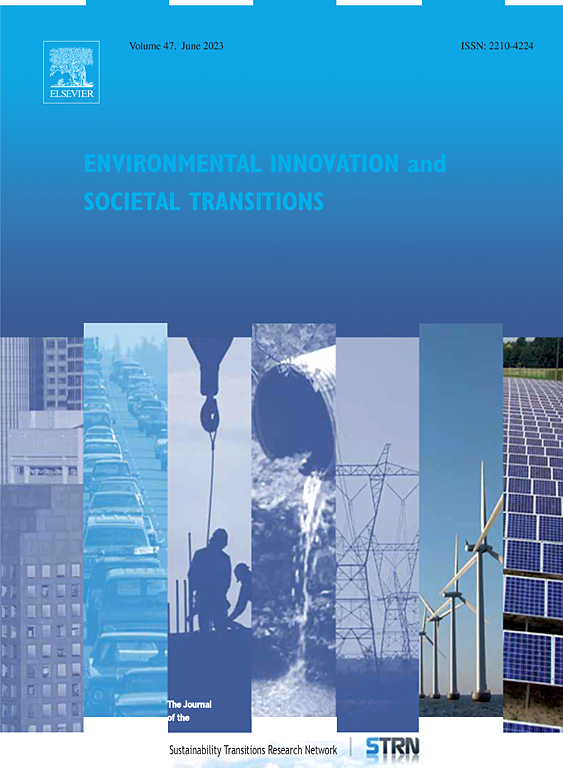解开数字化:一个与转型学者日益相关的话题
IF 6.1
2区 经济学
Q1 ENVIRONMENTAL SCIENCES
Environmental Innovation and Societal Transitions
Pub Date : 2025-06-11
DOI:10.1016/j.eist.2025.101021
引用次数: 0
摘要
随着人们对所谓的“双转型”(即可持续发展和数字化发展的交集)的兴趣日益浓厚,数字化已成为转型领域的一个感兴趣的话题。然而,尽管最近取得了进展,但该领域的数字化研究在概念和经验上仍然很狭隘。这一观点建立在之前呼吁转型学者更密切关注数字化的基础上,但主张在研究数字化的方式上提高多样性、创造性和清晰度。报告特别提出了三个主要的推进建议。首先,转型学者应该更批判性地接触数字化文献,以更好地理清数字现象的本质。其次,他们应该在发展对数字化的系统理解方面发挥主导作用,解决更广泛的数字化文献中的空白。最后,他们应该利用数字现象的概念灵活性来产生丰富过渡研究的新颖见解。数字化与可持续性之间的关系复杂而模糊,需要广泛的实证和理论方法来充分把握它们之间的相互联系。本文章由计算机程序翻译,如有差异,请以英文原文为准。
Untangling digitalisation: a topic of growing relevance for transition scholars
With the growing interest in so-called ‘twin transitions’, i.e. the intersection of the sustainable and digital development, digitalisation has emerged as a topic of interest within the transition field. However, despite recent advancements, research on digitalisation in this field remains conceptually and empirically narrow. This perspective builds on previous calls for transition scholars to pay closer attention to digitalisation but advocates for greater diversity, creativity, and clarity in how it is studied. In particular, it highlights three main suggestions for advancement. First, transition scholars should engage more critically with the digitalisation literature to better untangle the nature of digital phenomena. Second, they should take a leading role in developing a systemic understanding of digitalisation, addressing gaps in the broader digitalisation literature. Finally, they should leverage the conceptual flexibility of digital phenomena to generate novel insights that enrich transition studies. The relationship between digitalisation and sustainability is complex and ambiguous, requiring a broad array of empirical and theoretical approaches to fully grasp their interconnections.
求助全文
通过发布文献求助,成功后即可免费获取论文全文。
去求助
来源期刊

Environmental Innovation and Societal Transitions
Energy-Renewable Energy, Sustainability and the Environment
CiteScore
13.60
自引率
19.40%
发文量
90
审稿时长
56 days
期刊介绍:
Environmental Innovation and Societal Transitions serves as a platform for reporting studies on innovations and socio-economic transitions aimed at fostering an environmentally sustainable economy, thereby addressing structural resource scarcity and environmental challenges, particularly those associated with fossil energy use and climate change. The journal focuses on various forms of innovation, including technological, organizational, economic, institutional, and political, as well as economy-wide and sectoral changes in areas such as energy, transport, agriculture, and water management. It endeavors to tackle complex questions concerning social, economic, behavioral-psychological, and political barriers and opportunities, along with their intricate interactions. With a multidisciplinary approach and methodological openness, the journal welcomes contributions from a wide array of disciplines within the social, environmental, and innovation sciences.
 求助内容:
求助内容: 应助结果提醒方式:
应助结果提醒方式:


